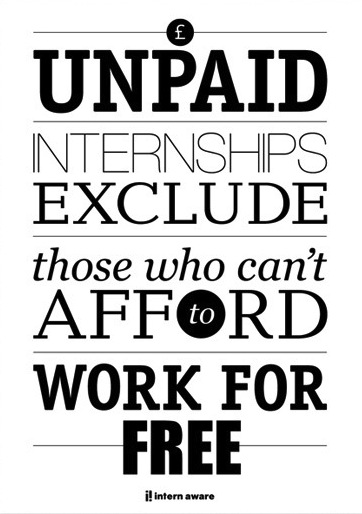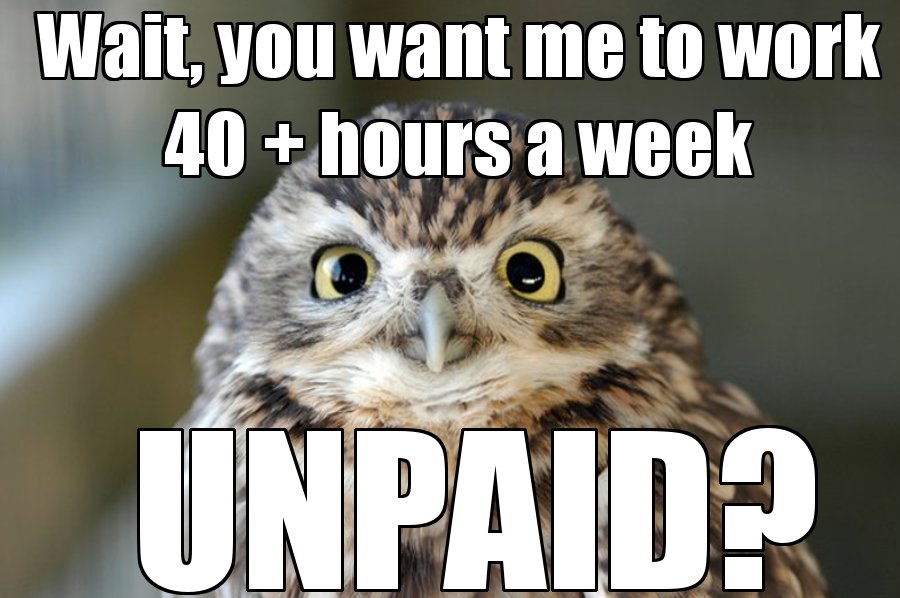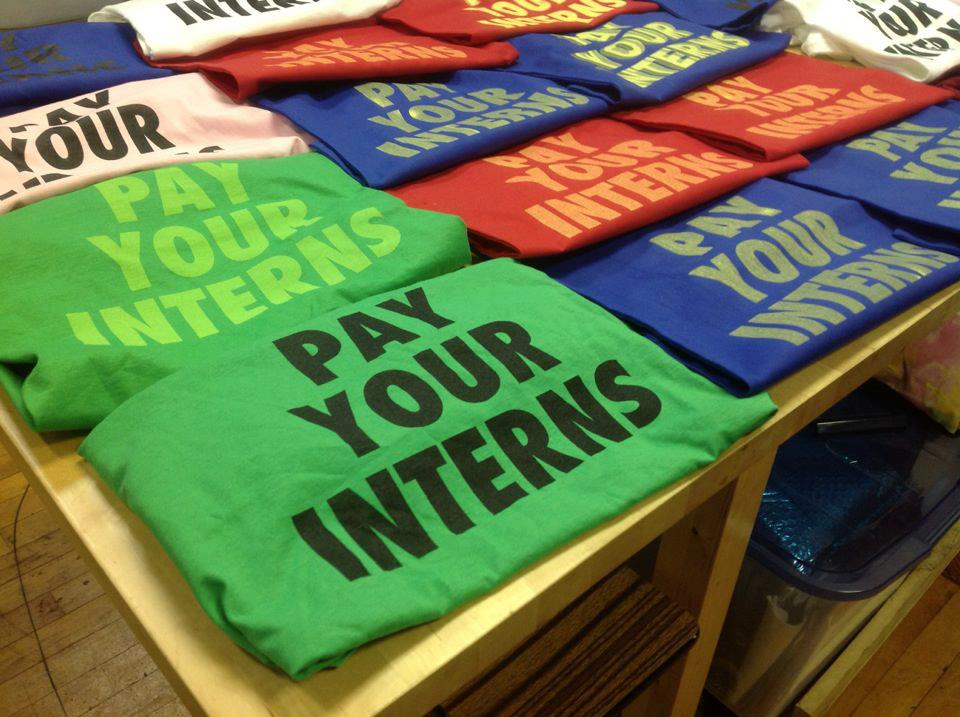Laura Tucker
The fight against unpaid internships continues this year with a growing number of interns looking to sue companies for unpaid work experience. And, despite the fact that many unpaid internships where the intern takes on real work are in fact unlawful in countries including the UK and the US, many employers apparently remain blissfully ignorant of the illegality this free labor.
Unpaid internship laws
In the UK it is a legal requirement to pay interns who count as ‘workers’, a worker being someone who does regular work for an employer under a contract or some other agreement regardless of whether the work is called an ‘internship’, ‘work experience’ or otherwise.
In the US the internship laws are a little more specific and, according to the US Department of Labor, unpaid internships at profitable companies are permissible as long as they follow a certain criteria. However, some would suggest the criteria are more than a little nonsensical (see final bullet).
- The internship must be similar to the training attained in an educational environment.
- The intern is not to provide replacement or cover of regular employees, but should work under close supervision of existing staff.
- The internship should benefit the intern, not the employer.
- The intern’s role is both impermanent and unwaged.
- And the most confusing point of all: the employer should not gain immediate advantage from the intern’s work and the company’s daily workload may even be hampered for the intern’s benefit.
The problem with this ruling is that if the company – by law – is not supposed to get anything out of hiring an unpaid intern, then why bother at all?
Universities taking action against unpaid work experience
 The rally for change of internship laws comes from all angles. Companies may still want free or cheap labor but it’s also certain that they would like their interns to actually help out in some capacity – and to pay for this work doesn’t seem like too much to ask. Students of course, want paid internships because then at least the ‘experience’ is financially viable, both in and outside of their studies.
The rally for change of internship laws comes from all angles. Companies may still want free or cheap labor but it’s also certain that they would like their interns to actually help out in some capacity – and to pay for this work doesn’t seem like too much to ask. Students of course, want paid internships because then at least the ‘experience’ is financially viable, both in and outside of their studies.
In a recent article published by The Guardian it was revealed that universities in the UK have begun to back up the paid internships rights of their students. Universities such as Goldsmiths University, University of the Arts London (UAL), Falmouth, Kingston and the University for the Creative Arts (UCL) have all stopped advertising unpaid internships positions on their student jobs websites in the past year. Previously unpaid, part-time work was accepted and readily advertised at schools like UAL but, having realized employers were sometimes even changing the job description upon start of contract, the university decided to draw a rather more immovable line in the sand.
Katie Mills, who is involved in student enterprise and employability at UAL, told The Guardian that a large number of employers weren’t aware of relevant internship laws. “We get employers phoning up saying ‘well I did an unpaid internship and it didn’t do me any harm’ and ‘my company can’t afford to pay someone but this is a really good opportunity’…That’s quite a good phone call to have actually, because it’s an opportunity for us to say that legally you have to pay them if they’re coming in for set hours and you’re expecting them to do set tasks. Many employers don’t know that.”
But there are still many advocators of unpaid internships, and the suggestion that internship laws are changed to bring about an outright ban of advertising unpaid internships has been rejected by the Deputy Prime Minister in the UK due to worries that it would lead to a “black market” of unpaid work experience, further exaggerating the opportunity deficit between students who can afford to work without pay and those who cannot.
Paid work experience more likely to lead to a job
There is also evidence that unpaid work experience isn’t overly successful in helping students gain permanent positions. The New York Times reported that in research led by the National Association of Colleges and Employers in the US, it was found that 61% of people who took a paid internship were offered a job at the end of it, compared to 38% of those who had undertaken an unpaid internship (making the latter group just slightly more employable than those who hadn’t completed any work experience at all).
Unpaid labor holds back the social mobility of young people in a very insidious way. It’s undeniable that not every student can afford to work for free, meaning that many unpaid internships go to students from wealthier (and often better-connected) backgrounds. This means that students without the financial means to support themselves and/or the benefit of influential contacts are often overlooked. But as long as those in more stable financial positions are willing to work for free in the hopes of moving up the career ladder, at least some companies will continue to exploit this system.
The inevitable unpaid internships backlash
 Momentum is definitely building in the fight against unpaid internships. Some former interns, incensed by the way they were treated during internships and rallied by other claimants, have attempted to sue for back pay. This happened late last year in the US in a case against Condé Nast and resulted in the company ending their internship program altogether – an extreme response that has put an end to a valuable launch pad for hundreds of aspiring journalists.
Momentum is definitely building in the fight against unpaid internships. Some former interns, incensed by the way they were treated during internships and rallied by other claimants, have attempted to sue for back pay. This happened late last year in the US in a case against Condé Nast and resulted in the company ending their internship program altogether – an extreme response that has put an end to a valuable launch pad for hundreds of aspiring journalists.
Hearst Magazines has also come under legal fire, after being sued by a former intern at Harper’s Bazaar, while the US courts also ruled that Fox Searchlight Pictures had broken employment law after not paying two interns for their work on the film Black Swan.
So the question remains whether to settle for an unpaid internship or wait for something to come along that pays. In the current economic climate and with some employers pulling out of work experience schemes altogether, opportunities for paid internships may be hard to come across, especially in sectors where they’ve become established as just part of ‘the way things are done’. As long as the job market remains saturated, employers are able to pick and choose among the best students and graduates at little-to-no wage.
Opportunities for paid internships on the up
 Recently however there have been some promising signs of increases in opportunities for paid internships. In the US, thousands of students fed up of working for nothing have begun to use a new service called Flinja, a rapidly growing freelance network of over 100,000 students and recent graduates. The site is a talent pool used by hiring companies and also appeals to successful alumni of certain universities who are looking to hire within their old college networks in order to help current students, along with the reputation of their alma mater.
Recently however there have been some promising signs of increases in opportunities for paid internships. In the US, thousands of students fed up of working for nothing have begun to use a new service called Flinja, a rapidly growing freelance network of over 100,000 students and recent graduates. The site is a talent pool used by hiring companies and also appeals to successful alumni of certain universities who are looking to hire within their old college networks in order to help current students, along with the reputation of their alma mater.
Santander’s internship program is just one UK-based scheme which aims to bridge the gap between unpaid and paid internships. The program partners with universities and smaller companies across the nation with the bank funding half of the £1,000 (approximately US$1,600) monthly salary of over 500 interns in order to help smaller companies to hire students and recent graduates who otherwise might have been too expensive to employ in a fully paid role.
One such Goldsmith’s University graduate is Hasna Haidar, who is undertaking her three-month internship with us here at TopUniversities.com. She says of her search for the position, “From reading through the Santander internships advertised by my university, every role seemed equally promising in terms of the experience the intern gains by the end of the three months. I was also pleased to discover that the organizers examine each internship beforehand to make sure the interns will be doing work that truly benefits them – no roles requiring only filing and making coffee make the list!”
“The best thing about the internship for me,” she continues, “is that every intern is treated like a regular member of staff – given real responsibilities and enough one-on-one training so they can work autonomously. And, if I wanted to gain more experience in a particular area of the company, I only have to ask! Regular team meetings mean everyone is up to date with what everyone else is doing, which really helps paint a picture of where the company is headed, and its overall aims.”
And although the scheme may not feasibly stretch to vast numbers, it at least shows that efforts are being made to make paid internships more widely available. And if you’re still not convinced by the evidence against unpaid internships, Matt Bors, a political cartoonist from the US, has this to add.
Image credits: University Times; InternAware.org; Ox.ac.uk.
Do you think unpaid internships should be banned? Share your opinion in the comments below.
